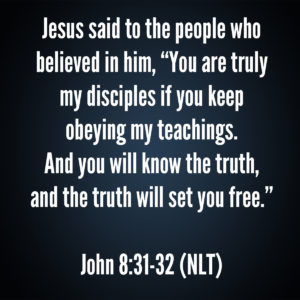When The Brook Dries Up (Part 2)

We are looking into the life of Elijah to learn principles of how to walk strongly with God in a broken and twisted world. We always need to remember that the brokenness of the world shaped much of what we expect from a good life and often those beliefs are misleading and also very harmful in walking with God. If you haven’t read the first article on this subject please do so before reading this one.
The Old Testament has a wealth of examples of not only how to walk strongly with God but also how to really screw your life up. I am so glad that God didn’t “sanitize” these great people of faith and only talk about their good qualities because then we could ignore their relevance for the average believer. It is very easy to look at heroes of our faith as being less than normal and thus discount the reasons they lived as they did and the great things they accomplished. Their stories are meant to inspire us to see our own potential not just make us feel less than qualified to experience the miracles they did. Miracles are still possible.
The story of Elijah’s life and the events of 1 Kings 17 illustrate how God will use any of us if we just trust in Him more than our own reason and wisdom. The passage in the book of Proverbs 3 speaks to the wisdom that King Solomon had but lost. It’s a wisdom about trust and reason, which is submitted to the will of God above all else..
Proverbs 3:5-8
Trust in the LORD with all your heart; do not depend on your own understanding. Seek his will in all you do, and he will direct your paths. Don’t be impressed with your own wisdom. Instead, fear the LORD and turn your back on evil.
Had Solomon followed his own advice his life would have turned out so much differently, but isn’t that how wisdom is. It’s easy to talk about or instruct others yet often very difficult to walk out.
Look at his advice –
1) Trust God with your heart – Your core and not just your mind. Don’t depend on just human reason and intelligence.
2) Seek God’s Will – His will produces a life filled with purpose and legacy.
3) Fear the Lord – Respecting God’s wisdom will help us not to be impressed with us.
So, if we look closely at the prophet Elijah, it is easy to see he followed this sound advice. When we first read about him in 1 Kings 17 we see he was led of God to speak to the king of Israel, who was one of the most corrupt. Without allowing fear to motivate him, Elijah prophesied that there would be no rain until he said so. Nobody in their right mind would do such a thing unless they were really sure this word came from God and not their own soul. Elijah was choosing to put his life in harm’s way by speaking this word. As we read further on in the story, King Ahab went on a man hunt to kill this brave prophet and any other prophets who would dare oppose him.
The end result of praying for no rain was Elijah praying for suffering to come on the king, the nation of Israel and himself. Most people who are prophetic rarely want or desire to prophesy doom and gloom yet Elijah did so because he wanted to be obedient to God. How many of us really risk our future and our lives to fulfill the will of God? James, the natural brother of Jesus, wrote in the book of James that Elijah was a man just like us with the potential of either letting fear rule his life or letting faith rule.
James 5:17
Elijah was a man with a nature like ours, and he prayed earnestly that it would not rain, and it did not rain on the earth for three years and six months.
So Elijah prayed and prophesied. The end result…… he had to get out-of-town and quick. God directs him to head east, live in the mountains and he would be fed.
1 Kings 17:5-8
So he went and did according to the word of the LORD, for he went and lived by the brook Cherith, which is east of the Jordan. The ravens brought him bread and meat in the morning and bread and meat in the evening, and he would drink from the brook. It happened after a while that the brook dried up, because there was no rain in the land.
Consider this, Elijah obeys the Lord and the prophecies. He runs out-of-town and hikes 30 miles up a mountain and lives alone for one whole year. He doesn’t know if soldiers will come and arrest him and take him back to face King Ahab and certain death. He just waits for one year and eats the same thing day after day. I don’t know about you but if this was me I would be going seriously stir crazy! I would eventually start complaining to God about my condition. Is this fair God? I did what you asked and what do I get? Meat delivered by unclean birds and meat that was from dead animals. Yes, ravens were scavengers like buzzards.
At this point, let us consider what we believe about being obedient to God. I think most of us believe that if we are obedient that God will bless us? Dose Elijah’s predicament look blessed to you? It doesn’t to me. Is it possible we have taken scripture and stretched the portion about blessings to the point that we believe God should and will bless us always if we are obedient?
After a year of being alone and eating disgusting food, Elijah finds his meager provisions “DRYING UP” without notice. The prophecy did not have a time limit but look at what it says,
[7] It happened after a while that the brook dried up, because there was no rain in the land.
I can’t even imagine what my attitude would be if the provision just “HAPPENS” to stop for no apparent reason, but that did not stop Elijah. So many professing Christians have walked away from their professed faith because God didn’t bless them as they thought, and maybe even were taught, he should. They have become bitter and resentful to the point that they end up worse than before they professed Christ. Unforgiveness doesn’t just happen between friends and relatives. It also happens between us and God. The reason? A wrong concept of who God is and who he is not. A wrong belief about the promises in scripture and our sense of entitlement from God.
In the next article, I want to continue to explore this idea. I think there are some great truths in 1 Kings that will challenge us and I hope really bless our walk with God and others. I want to dissect how we get divine guidance, how we prepare to handle the will of God and how we can respond to “CHANGE” in our walk with God.
Questions:
1) Have you swallowed the lie that God is obligated to always bless your obedience? Many saints throughout the ages did not believe this and paid dearly with suffering and even death.
2) Are you surprised when your provision from God stops? It can happen but does that mean that God is no longer faithful or trustworthy?
These are tough questions that all of us need to ponder so that our faith doesn’t get shaken.
Pastor Dale




Leave a Comment